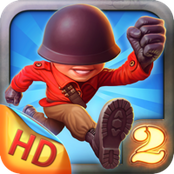Professional Writing

Fieldrunners 2
Fieldrunners 2 was THE highest rated app store title of 2012. With the founders focused on artwork, I had a relatively free hand as the writer for Fieldrunners 2. With over 1,500 lines total in the game, there was plenty of space to add short snippets of lighthearted, irreverent worldbuilding.
And in one of my proudest moments in game development, my writing earned three front-page reddit threads. And
Fieldrunners 2 was THE highest rated app store title of 2012. With the founders focused on artwork, I had a relatively free hand as the writer for Fieldrunners 2. With over 1,500 lines total in the game, there was plenty of space to add short snippets of lighthearted, irreverent worldbuilding.
And in one of my proudest moments in game development, my writing earned three front-page reddit threads. And

Gamasustra
Before Gamasutra published arbitrary blogs, they published carefully crafted submitted articles. In 2007 I published an article through them, "Establishing a Beachhead in a Crowded Genre," documenting some of the repeated mistakes the industry makes while chasing hits.
Before Gamasutra published arbitrary blogs, they published carefully crafted submitted articles. In 2007 I published an article through them, "Establishing a Beachhead in a Crowded Genre," documenting some of the repeated mistakes the industry makes while chasing hits.

Happy Puppy Scoop
volume 2, issue 5
(At one point Happy Puppy was the #1 visited game website on the internet. It was shuttered in 2006. Article text is below.)
Ah, beautiful, beautiful shareware. You'll have to excuse me: I was born and raised a Macintosh man, and while my body has walked through the Gates of hell, my soul is still with that happy little box. All we had were a few talented programmers (Greg Landweber, Cassady & Greene, David and Tom) churning out cheap but fun little games. My friends and I would alternate on our one little Macintosh, I believe it was an LCII, for hours on end. Games had innovation back then, and not much else. Pararena was an innovative cross between basketball and skating in a pool, by the talented people at MacSoft. They also created Crystal Quest and Gopher Golf, before selling out to Unreal and Quake translations. Pangea had the idea to base a game completely on the art of smashing mosquitoes. Their creation is one of the most comically and artistically disgusting games of all time: Bloodsuckers. Fantasoft brought us the completely engrossing, always bewitching, and perpetually crashing Realmz. Ambrosia blew the top off of the professionalism in shareware when they created their world-famous asteroids clone, Maelstrom. And then there was Underwear Girl. What do you expect from a group called "Naked Rabbit?"
But store-bought software eventually began to intercede. The first really must-buy came from Delta Tao, in the form of Spaceward Ho! (To this day, it's one of my favorite games.) Then came Maxis and their simulated city. Sierra finally started bringing us Space Quest. Id's shareware Wolfenstein was just an effective teaser for the full thing. Then came Bungie, and we all had to give in and buy Marathon. Marathon, it would seem, was the beginning of the end of the golden years.
Shareware on the PC just isn't the same. A good shareware game on the Mac was the best of what was available at the time. The developer was traditionally just some talented guy and a friend who enjoyed programming on the weekends. They'd email you back pretty fast, and send you disks full of stuff just because they liked you. It was small, it was communal, it was friendly. It was all we had. PC shareware has traditionally been a tool to sell more of a retail game, or for programmers who can't hack it at bigger companies that try (and fail) to strut their stuff. On the PC, shareware is dead. We didn't send in our fees. We copied them freely. We ResEdited out the sounds we liked and made our computer sound like Maelstrom on startup. We filled up disk after disk after disk. Half of the programs were junk. Half were amusing. Some were as inane as Baby Smash. Some were as great as Quagmire. Over all, it was a good time to be a Mac Fan, and I'll forever mourn the passing of Shareware as an art, a culture, and a community. All love to Ambrosia, Syzygy cult, Hot Rod, Cellusoft, Mac Soft, Delta Tao, Greg Landweber, Cassady & Greene, Freeverse, and all of the early Mac programmers that made my childhood worth living.
Sincerely,
Chris Canfield
volume 2, issue 5
(At one point Happy Puppy was the #1 visited game website on the internet. It was shuttered in 2006. Article text is below.)
Ah, beautiful, beautiful shareware. You'll have to excuse me: I was born and raised a Macintosh man, and while my body has walked through the Gates of hell, my soul is still with that happy little box. All we had were a few talented programmers (Greg Landweber, Cassady & Greene, David and Tom) churning out cheap but fun little games. My friends and I would alternate on our one little Macintosh, I believe it was an LCII, for hours on end. Games had innovation back then, and not much else. Pararena was an innovative cross between basketball and skating in a pool, by the talented people at MacSoft. They also created Crystal Quest and Gopher Golf, before selling out to Unreal and Quake translations. Pangea had the idea to base a game completely on the art of smashing mosquitoes. Their creation is one of the most comically and artistically disgusting games of all time: Bloodsuckers. Fantasoft brought us the completely engrossing, always bewitching, and perpetually crashing Realmz. Ambrosia blew the top off of the professionalism in shareware when they created their world-famous asteroids clone, Maelstrom. And then there was Underwear Girl. What do you expect from a group called "Naked Rabbit?"
But store-bought software eventually began to intercede. The first really must-buy came from Delta Tao, in the form of Spaceward Ho! (To this day, it's one of my favorite games.) Then came Maxis and their simulated city. Sierra finally started bringing us Space Quest. Id's shareware Wolfenstein was just an effective teaser for the full thing. Then came Bungie, and we all had to give in and buy Marathon. Marathon, it would seem, was the beginning of the end of the golden years.
Shareware on the PC just isn't the same. A good shareware game on the Mac was the best of what was available at the time. The developer was traditionally just some talented guy and a friend who enjoyed programming on the weekends. They'd email you back pretty fast, and send you disks full of stuff just because they liked you. It was small, it was communal, it was friendly. It was all we had. PC shareware has traditionally been a tool to sell more of a retail game, or for programmers who can't hack it at bigger companies that try (and fail) to strut their stuff. On the PC, shareware is dead. We didn't send in our fees. We copied them freely. We ResEdited out the sounds we liked and made our computer sound like Maelstrom on startup. We filled up disk after disk after disk. Half of the programs were junk. Half were amusing. Some were as inane as Baby Smash. Some were as great as Quagmire. Over all, it was a good time to be a Mac Fan, and I'll forever mourn the passing of Shareware as an art, a culture, and a community. All love to Ambrosia, Syzygy cult, Hot Rod, Cellusoft, Mac Soft, Delta Tao, Greg Landweber, Cassady & Greene, Freeverse, and all of the early Mac programmers that made my childhood worth living.
Sincerely,
Chris Canfield
Blogs
Not Shippable, a blog ostensibly about game development.
|
